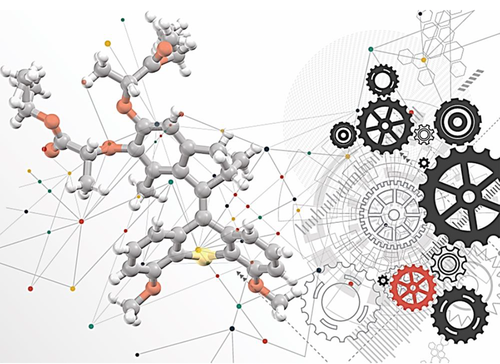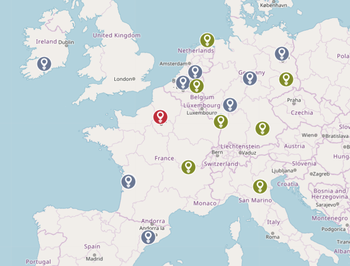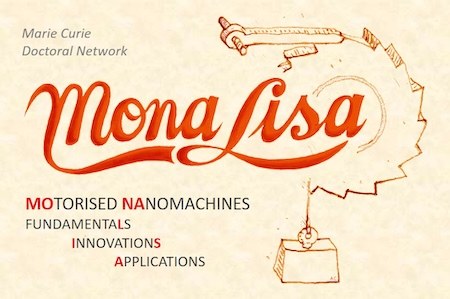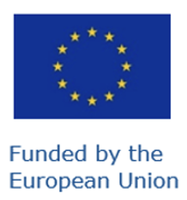
Motorized nanomachines: fundamentals, innovations, applications
Horizon Europe Marie Sklodowska-Curie Doctoral Network

Objective
MonaLisa, a pioneering European consortium, is at the forefront of artificial molecular machine research, setting the stage for breakthroughs in chemical synthesis, nanotechnology, medical treatment and smart materials. Building on the foundational work recognised by the 2016 Nobel Prize in Chemistry, MonaLisa aims to make groundbreaking discoveries in the design and functional control of molecular machines that will lead to first demonstrations with practical relevance.
At the heart of MonaLisa is an innovative training programme. Fifteen doctoral candidates will receive comprehensive mentoring and training to become future leaders in the field. The programme is designed to foster not only academic excellence but also entrepreneurial skills, enabling these professionals to translate scientific breakthroughs into innovations and support evidence-based decision-making.
The strength of MonaLisa lies in its joint vision and collaborative framework, bringing together top scientists, including four Nobel laureates, prestigious institutions and a wide range of industry partners. The non-academic support ranges from dynamic SMEs to large global players, supported by leading organisations that act as multipliers, fostering new programmes and partnerships. Looking to the future, MonaLisa is committed to developing sustainable, educational structures that integrate the non-academic sector to cultivate skills essential for the academic and non-academic workplaces of the 21st century. This initiative will increase collaboration, research intensity and innovation capacity within the European chemistry ecosystem. In doing so, MonaLisa is poised to secure Europe's leadership in science and technology, driving economic growth and societal benefits.

The Project Consortium
Beneficiaries
CNRS - Centre Nationale de la Recerche Scientifique - France
Institut Charles Sadron (Chemistry & Physics of Soft Matter)
Prof. Nicolas Giuseppone
RUG - Rijksuniversiteit Groningen - The Netherlands
Stratingh Institute for Chemistry (Chemistry & Physical chemistry)
Prof. Ben Feringa - Nobel Laureate
UNIBO - Alma Mater Studiorum - Università di Bologna - Italy
Dipartimento di Chimica Industriale "Toso Montanari" (Chemistry & Physical Chemistry)
Prof. Alberto Credi
TUM - Technische Universität München - Germany
Center for Nanotechnolgy and Nanomaterials (Biology, Biophysics)
Prof. Friedrich Simmel
TUD - Technische Universität Dresden - Germany
CUBE – Center for Molecular Bioengineering (Biology, Biophysics)
Prof. Stefan Diez
UNISTRA - Université de Strasbourg - France
Institut de Science et d’Ingénierie Supramoléculaires (Chemistry)
Prof. Jean-Marie Lehn - Nobel Laureate
ULIEGE - Université de Liège - Belgium
Département de chimie (Chemistry, Nanotechnology)
Prof. Anne-Sophie Duwez
SOLVAY - Specialty Operations France Solvay - France
R&D department (Chemical Engineering)
Dr. Jean-Francis Spindler (Scientific Director)
SOPREMA - Soprema Company - France
R&D department (Material Science)
Rémi Perrin (R&D Director)
Associated partners
Orgentis Chemicals (Germany), Xeltis (The Netherlands), Millipore Merck (Ireland), Clariant AG (Spain), DESCA (USA), Springer Nature (Germany), Wiley-VCH (Germany), Foresight Institute (USA), Oriensys (France), EuChemS (Belgium), University of Bordeaux (France)

The training program
Artificial molecular machine research and technologies are critical fields with the potential to offer significant benefits to chemical synthesis, medical technologies and treatment, smart materials, and nanotechnology. However, due to their novelty, there is a shortage of specialists in this sector, resulting in limited research manpower. With the support of the Marie Skłodowska-Curie Actions programme, the MonaLisa project will bring together specialists, Nobel laureates, prestigious institutions, and various non-academic partners to develop and implement an innovative training programme for doctoral candidates. This extensive, in-depth training from expert researchers will enable the candidates to gain a deep understanding of the field and transform their findings into innovative solutions.
The Project structure: Workpackages
WP1: Fundamentals and innovations using biomolecular motors (Lead beneficiary: TUD)
WP2: Fundamentals and innovations using artificial motors (Lead beneficiary: UNIBO)
WP3: Applications of molecular motors (Lead beneficiary: RUG)
WP4: Scientific and transferrable skills training (Lead beneficiary: ULIEGE)
WP6: Management and coordination (Lead beneficiary: CNRS)

PROJECT FACTS
Project type: 2023 Marie Sklodowska Curie Action (MSCA) Doctoral Network (DN)
Funding: Horizon Europe, Europe's research and innovation program
Budget: 4,048,480.80 €
Grant agreement: 101169136
Duration: 48 months
Start: 1st December 2024
End: 30th November 2028
CONSORTIUM FACTS
Project coordinator: Prof. Nicolas Giuseppone, Centre Nationale de la Recherche Scientifique (CNRS)
Number of beneficiaries: 9 (6 Universities, 2 Companies, 1 Research Center)
Number of partners: 11 (5 Companies, 2 Publishing houses, 1 Foundation, 1 Scientific Society, 1 University, 1 Research Institute)
Number of PhD positions: 15
Beneficiary countries involved: 5 (Belgium, France, Germany, Italy, The Netherlands
Number of Nobel Laureates involved: 2
PhD Position - DC05
Title: Polymeric materials for non-equilibrium photo- and electro-mechanical actuation
Start date: 1 Nov 2025
Application deadline: 9 Jun 2025 23:59 (Europe/Rome) - EXPIRED
PhD Position - DC06
Title: Geared movements in mechanically interlocked systems
Start date: 1 Nov 2025
Application deadline: 9 Jun 2025 23:59 (Europe/Rome) - EXPIRED